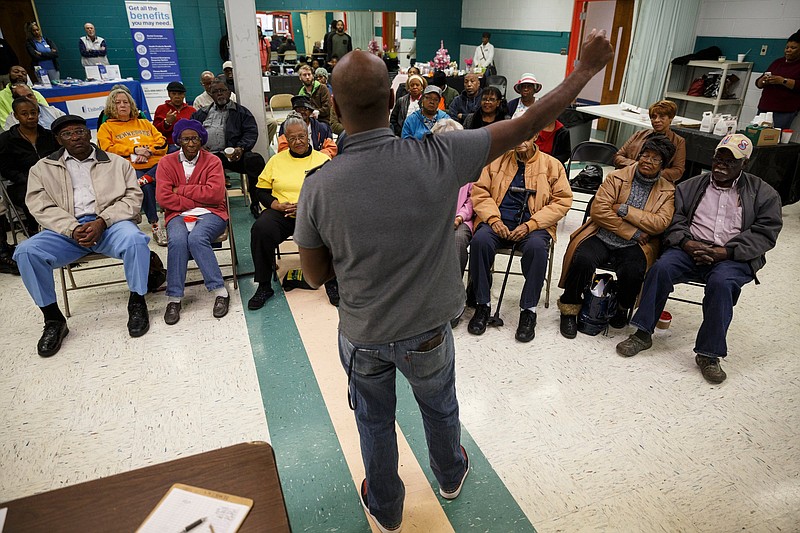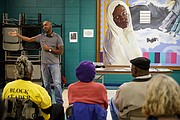I want you to put yourself in our shoes in Avondale.
Horrible roads. High taxes. A severe lack of affordable housing. Speculative real estate purchases left vacant and drawing crime. A seething anger over the historic disregard for African-American neighborhoods by the business and political establishment.
The list of residents' complaints at District 8's "Coffee with a Councilman" was long.
"I want someone who will bite and get our rights fulfilled," said Cynthia Stanley- Cash, president of the North Brainerd Neighborhood Association. "Now we have to train a new person. There are people behind you, watching that seat. People want these seats, and we want minority representation. Good leadership is what we demand."
Still, District 8 Chattanooga City Councilman Anthony Byrd told the crowd of more than 70 gathered Saturday morning at the Carver Recreation Center that he wanted to cut through the emotions and speak to political reality, especially when it came to decisions regarding Lincoln Park and the rezoning of the former Harriet Tubman public housing site.
"I feel sad," Byrd told his lively group of constituents, which includes many neighborhood leaders. "The reason I feel sad is that I want to help. I don't want to not do what is right by you. I have no personal vendetta. Why would I lie to you? I have been fighting for roads to get paved. It is a bartering situation. We have to work together."
Byrd asked Avondale homeowner James Moreland to explain the political nuance of the Harriet Tubman rezoning. The city of Chattanooga purchased the former public housing project several years ago with the intention of using it for job creation. The city now wants to push forward with rezoning the site from residential to light industrial use.
Several East Chattanooga residents and stakeholders have asked for the city to hold off on the rezoning until the Area 3 planning process, which continues to be delayed, is completed. Area 3 includes neighborhoods such as Avondale, Battery Heights, Boyce Station, Bushtown, Churchville, Ferger Place, Gaylan Heights, Glass Farms, Glenwood, Highland Park, Missionary Ridge, Oak Grove, Orchard Knob, Ridgedale, Riverside, Waterhaven and Wheeler Avenue.
Others have said they want to see the Tubman property zoned for mixed use. Records show staff at the Chattanooga-Hamilton County Regional Planning Agency had once advocated for mixed use.
The Chattanooga Housing Authority was going to sell the Tubman site to "a slumlord" from out of town who was going to keep the deteriorating buildings open, said Moreland.
"It was a hellhole before it was turned down. We went on the news every day concerning crime," he said.
The Avondale Neighborhood Association begged Chattanooga Mayor Andy Berke to intervene. When Berke was reluctant, Moreland told the crowd, they negotiated.
"The crime level will go down if you buy it," Moreland said he told Berke. "We need jobs."
"I want you to put yourself in our shoes in Avondale," he said. "We would be crazy to go back to the city and say we changed our minds."
"I understand that we made an agreement, but sometimes agreements are broke," a man in the crowd said to Moreland.
"I am embarrassed to think that a black man has to put a factory by his house to work. If you want to work, you work. What we need is people developing these young people's minds!" the man said. The room erupted in applause.
Patrick Kellogg, an Avondale resident who also lives near the Tubman site, told Byrd he remembers the events surrounding the city's purchase of the Tubman site differently than Moreland.
"We orchestrated for mixed-up development," said Kellogg, before reminding the crowd to attend the RPA's Dec. 10 meeting if they want to oppose rezoning Tubman to a single use, light industrial.
When it came to the political situation with Lincoln Park - the historic African-American park the city built to support segregation and now wants to cut through to improve traffic patterns in an area of great import to both Erlanger hospital and developers - Byrd said the city and neighborhood leaders are in a standoff.
Byrd said he wants Lincoln Park, which needs around $500,000 in infrastructure improvements, to look like Coolidge Park and the new Miller Park. But he also supports the proposal for a road that would connect Central Avenue directly to Riverside Drive.
"We need a corridor because the community is growing." Byrd said.
The mayor is willing to leave 5 acres of Lincoln Park, and give $2 million toward park improvement, but he wants the road, Byrd said. Erlanger offered to give another $1 million, and University of Tennessee at Chattanooga officials said they would contribute, too, he said.
"I thought it was a good idea," Byrd told the crowd. "Neighborhood leaders don't want the road."
Tiffany Rankin and her mother, Vannice Hughley, president of the Lincoln Park Neighborhood Association, worked hard to get the park's federal historic designation, Byrd said. Now "it can't be touched."
Byrd said neighborhood leaders fear the new road will lead to more development and displace longtime residents, but it may already be too late. Developers already have bought up almost 70 percent of Lincoln Park homes.
"If at any time they decide to not rent to you they can say, 'Your lease is up,'" he said. "The community can be gentrified and changed just like that."
When asked after the meeting what she thought about Byrd's characterization of the Lincoln Park situation, Rankin was direct.
"I think he is campaigning for 2020."
Contact staff writer Joan McClane at jmcclane @timesfreepress.com or 423-757-6601.

